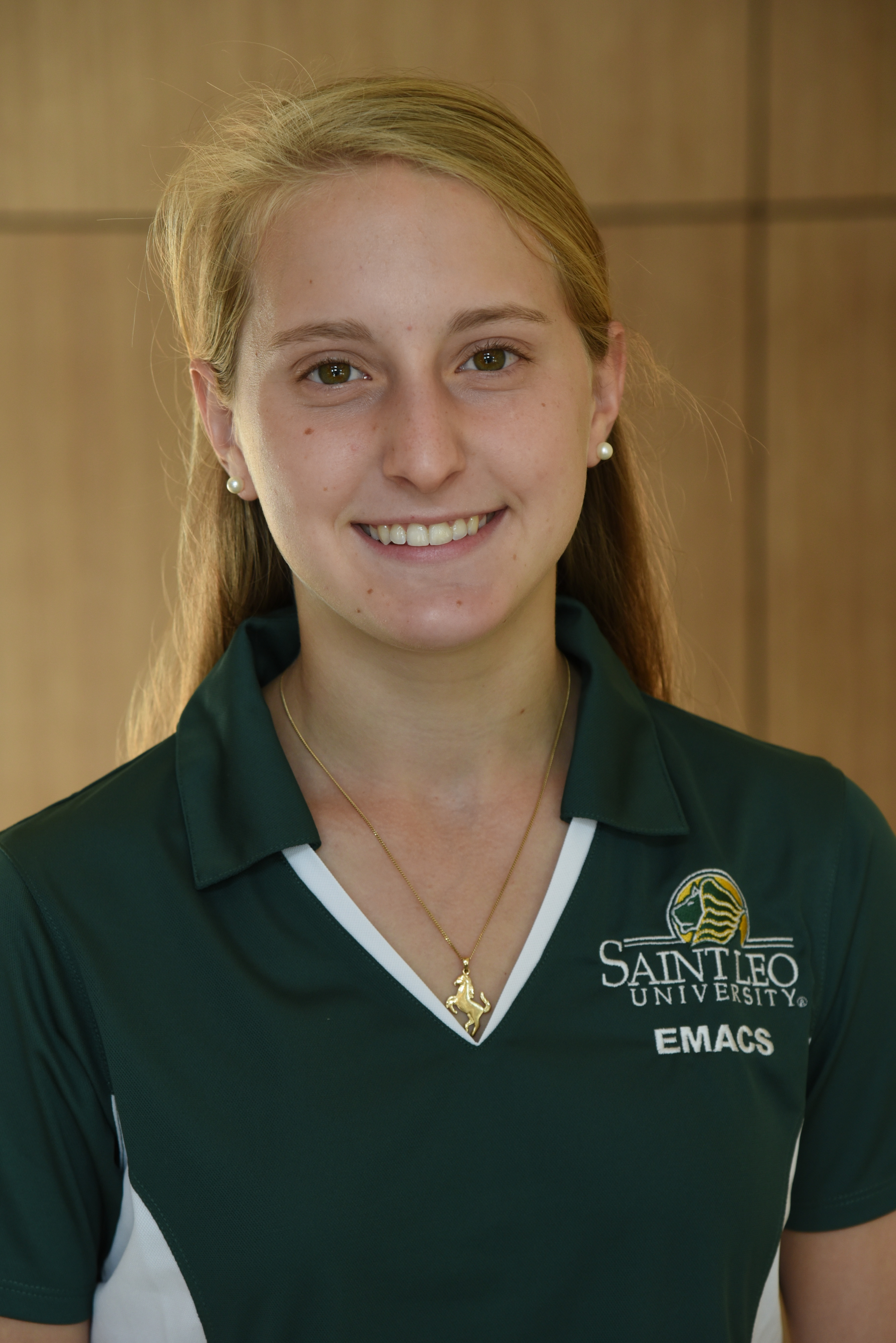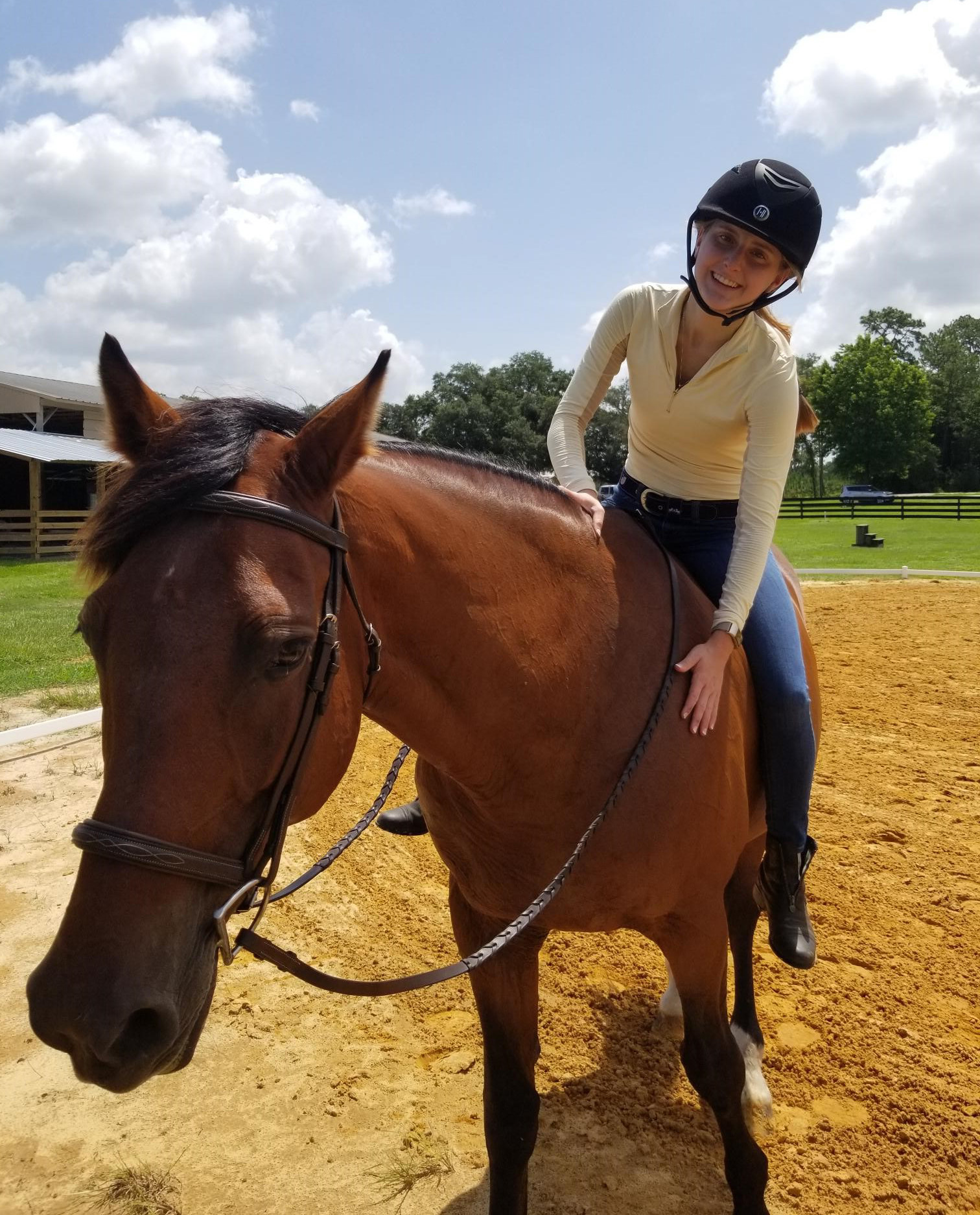Special Saint Leo Program Puts 19-Year-Old on Road to Computer Technology Career
Orlando-area native balances a computer science major, ministry activities, and an outdoorsy hobby

Orlando-area native balances a computer science major, ministry activities, and an outdoorsy hobby


When Christine Potthast was 17 years old and living with her parents in suburban Orlando, it was not immediately clear what would be the best choice for her college years. The home-schooled teenager was already earning some college credits from courses taken at nearby community colleges, and it seemed probable that she had an aptitude for computer science and mathematics inherited from her parents. A Catholic institution with a small-school atmosphere held a personal appeal for her, but she had not settled on which one.
And then, Saint Leo University started recruiting talented high school students to form a new cohort of incoming freshmen who would be called Emerging Mathematics and Computer Science (EMACS) scholars. The National Science Foundation had just awarded Saint Leo a grant allowing the university to dispense a limited number of special tuition scholarships for students who hope for technology careers. Not only would the students receive renewable awards of $8,000 or more (as long as they maintained grades and requirements), they would also benefit from special mentoring and career exploration programming to help them maintain an interest and pathway into a career in science, technology, engineering or mathematics (STEM) fields. Another plus of the program is that it permits students who are eligible to receive other financial aid awards as well as the EMACS award, making college that much more affordable.
For Potthast, who is the youngest of four siblings, the EMACS grant tilted the balance toward Saint Leo. Evidence came back fast that she made the right choice. She took her first computer programming class at Saint Leo, which turned out to be "really fun," and helped confirmed her interest in the computer field. Further courses and two summer work experiences in programming have added to her confidence. She was right, too, in thinking that she would enjoy the beauty of the campus, and that a welcoming campus culture with small class sizes would best suit her personality.
"Christine's experience really confirms that students who are looking for careers in STEM fields, and who also want college settings that will help them grow personally, can really find everything they need at places like Saint Leo," said Dr. Vyas Krishnan, who directs the EMACS program and teaches computer science.
Two years after her orientation, Potthast is flourishing, thanks to her own solid work habits, the academic programming available to her, and the special environment the main campus provides, Krishnan observed.
Even she is stunned at the pace of progress. "Everything is going super-fast," she said.
The other students in her EMACS cohort and in her Honors Program classes (she was accepted into that program as well) have become her regular companions. And it's not all work, either: there are trips to the beach for the Florida native, and fun and spiritually fulfilling times with the other students involved in University Ministry. "It is very much a community of really great people." Along with the praise and worship activities, the social aspect has allowed her to shed some of the shyness that characterized her mid-teens.
"I have definitely come a lot more out of my shell from when I came here," she said. "Good job, Saint Leo."
Saint Leo administrators were also very glad that Potthast chose the Benedictine Catholic school. Early on, there were attributes evident from her educational records that indicated she would be a good member of the first cohort of eight Emerging Mathematics and Computer Science Scholars. Home-schooled students, especially those who appreciate personalized learning environments and demonstrate well-developed study skills, can do very well at Saint Leo, faculty have found.
In the case of the Potthast family, Christine's mom Genevieve Potthast, has been a strong educational leader of the household, according to her daughter. The mother pulled curriculum materials together from a variety of sources and planned the school year well in advance. "She's a super-organized person," said Christine of her mother. Genevieve Potthast is also so accomplished in math that she became the natural teaching expert in that subject for fellow home-schooling families. She was also diligent in passing along to her children her fluency in (Canadian) French. The result was that Christine passed college-level placement tests exempting her from introductory language coursework at Saint Leo.
The Potthast home schooling regimen also allowed Christine time for other activities, such as dance and horseback riding lessons. The interest in horses, which began at age 10, really took hold, and she became an equestrian athlete as a teen. That also impressed the Saint Leo Admissions Office. Admissions officers have seen that young people with both good grades and demanding hobbies or chores have generally learned to budget their time well and motivate themselves – key ingredients in academic success.
So it was with the young Christine. The daughter learned to think like her mom about time management, and attended to school work promptly to leave time in the day for her stable visits. She recalled thinking to herself: "OK, this is what I have to do today, but I want to go see my horse today, too."
Happily, Saint Leo University has been beneficial for the bond Potthast maintains with her horse, a 13-year-old Dutch Warmblood. A private boarding stable operates near the Pasco County main campus, so her family helped her move her horse there and left her with a family car on campus. That way, she can drive over weekly (or more frequently) for visits and exercise sessions at the stable and paddock, even though her horse is now too infirm to compete.
 University administrators were even more tickled by the story when they learned the name of their new student's horse. It is Leo, just like the university, and the religious and educational leaders the name honors. That proves the young rider was meant to enroll at Saint Leo, administrators like to say.
University administrators were even more tickled by the story when they learned the name of their new student's horse. It is Leo, just like the university, and the religious and educational leaders the name honors. That proves the young rider was meant to enroll at Saint Leo, administrators like to say.
Potthast's presence on campus and her good study habits appear to have set an example for her EMACS peers. At first, faculty members thought she was responsible for scheduling group study sessions.
But that's not quite right, she said. She does like to tackle her assignments and tasks soon after she logs them into her phone, and takes advantage of natural down time in her schedule. "Luckily, I'm a social studier," she said. "I don't need quiet. I actually work better when there is noise around. So I can hang out with my friends and do work." The others just join in.
Potthast has also been influenced for the better by Saint Leo. In her Honors Program classes, instance, students are required to read extensively from many fields of knowledge, including the evolution of science, philosophy, theology, ethics, politics, and more, and then be ready to present and discuss opinions in class.
That is an adjustment for a young person who is reluctant to engage in debate because it seems too much like an argument instead of an intellectual exchange of competing ideas. "It's definitely an experience," Potthast said, but she acknowledged the seminar classes are making her "more comfortable presenting all the time."
Other opportunities are drawing her out, as well. She added a minor in mathematics since it complements computer science, and has already served as president of the Math Club.
EMACs students also participate in activities from demonstrating to school-age children how robot kits can be used to make a functioning device, to meeting with executives from various companies or workplaces about career opportunities and internships in their respective fields. So all are becoming exposed to situations intended to help them become well-rounded entry-level professionals.
Potthast is coming back to campus early to help with August orientation. She enjoyed her second college summer work experience (at an engineering company in Texas) just as much or more than her first summer job handling some software programming duties at a company close to home. She will proceed right into senior-year-level work in her major after only two years of Saint Leo classes, thanks to the early credits she earned completing community college courses, and her success in "testing out of" some introductory courses. She does not need the typical four years of classes to complete the requirements for her bachelor's.
Consequently, Potthast was allowed to enroll in an accelerated option Saint Leo offers in some majors, called "3 + 1 programs." These programs allow students with sufficient credits to complete their bachelor's degree requirements in three years, and then continue into a master's curriculum.
In this case, Potthast will be have earned all the credit she needs for her Bachelor of Science in computer science in Spring Semester 2020. Then she can enroll during the Summer Semester 2020 in the Master of Science program in cybersecurity, which requires 36 credit hours of study. Her EMACS program scholarship can be applied to her master's degree.
She considers herself fortunate to be in a position in about two more years to enter the workforce from Saint Leo with an advanced credential, she said. "When I get to the end," she said, sounding a bit surprised, "I'm going to be 21 with a master's degree."